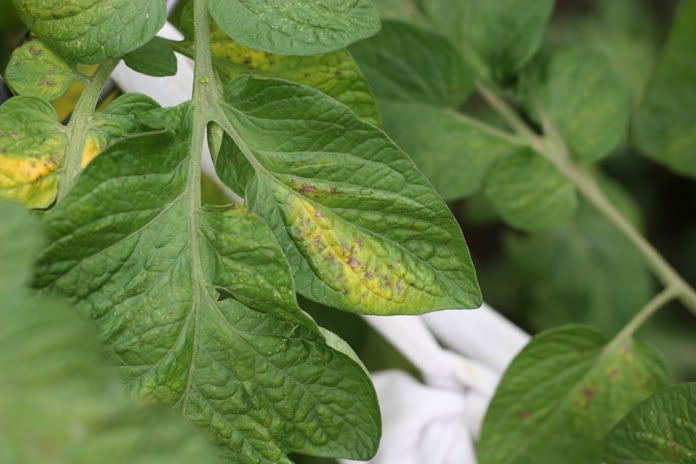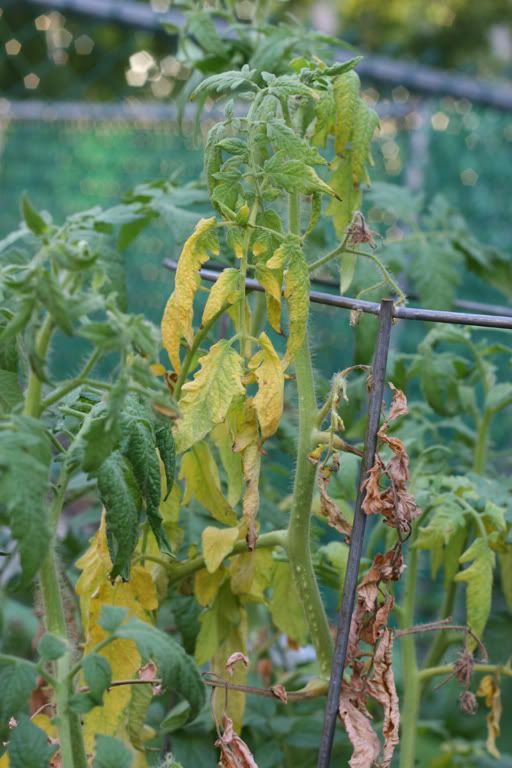

|
Information and discussion regarding garden diseases, insects and other unwelcome critters.
|
 |
|
|
Thread Tools | Display Modes |
|
|
#1 |
|
Tomatovillian™
Join Date: Feb 2008
Location: Staten Island, NY, zone 6b/7a
Posts: 3
|
Hello Everyone,
My first post here, though I lurked for a couple of month and I hope someone can pinpoint what is wrong with a couple of my plants. I think the pictures with the spots may be a fungal decease, since I have seen it on a few rose bushes I grow but I wanted to double check. The first two pictures are of a plant where a third of the leaves turned yellow over a period of a few days.   The next few pictures are of a few leaves on adjoining plants where only a few leaves per plant are affected so far.     I am grateful in advance for any assistance anyone can offer in identifying the problems with my plants. This is only my second year growing tomatoes. Last year I planted a Yellow Pear and a German Queen. This year I have gotten more ambitious with 11 plants including 4 in Earthboxes (which are now all suffering from BER). Dimitry 
|
|
|

|
|
|
#2 |
|
Tomatovillian™
Join Date: Apr 2007
Location: Campbell, CA
Posts: 4,064
|
Dimitry,
Welcome to Tomatoville. Great place to learn and ask questions. Regarding your photos, some yellow leafing is quite normal as the plant ages. Also, the pics showing purple spots appear indicative of Early Blight. I use an organically friendly fungicide called Serenade. Here is a good reference site with comparative photos that may help you further. http://aggie-horticulture.tamu.edu/t...ver/index.html Ray |
|
|

|
|
|
#3 |
|
Tomatovillian™
Join Date: Jan 2007
Location: PNW
Posts: 4,743
|
Last first: BER is a calcium deficiency disease. Plants can get
it from not enough calcium in the soil, soil too dry (can't absorb the calcium that is there), and a fast growing plant in hot weather (all of the calcium that it absorbs ends up in new leaves and stems). Treatments in spring include amending the soil with gypsum or lime (gypsum if soil pH is fine, lime if soil pH is on the acid side for vegies, say below 6.0). You can get some relief by trimming off lower leaves below the fruit, but if the soil is truly calcium-deficient, that won't solve it. A spray that might have results (a bit pricy) is Nutri-Cal: http://store02.prostores.com/servlet...um-lime/Detail (Keep in mind that 16oz is about a pint.) No guarantee here, because the fruit itself can't really absorb calcium through its skin. If it works at all, it works by saturating the leaves with calcium, so that any calcium taken in by the roots can go to the fruit instead. The necrotic spots do look like a disease (bacterial or fungal). You can find a photo guide for identifying tomato diseases here: http://aggie-horticulture.tamu.edu/t...ver/index.html (None of my plants have had that, so I have no guess as to what exactly it might be.) The yellow leaves look like iron or nitrogen defiency. Iron deficiency starts at the top of the plant and works its way down (shows on new leaves first). Nitrogen defiency starts on older leaves at the bottom of the plant and works its way up. (Could also be simple lack of water or roots drowning in way too much water in soil that drains very slowly, but only you would know about either of those conditions.) Try some fish emulsion if you have some on those. You can both soil drench (2 tablespoons per gallon) and foliar feed (1 teaspoon per gallon) with it. If the leaves start to turn green again, toss another handful of fertilizer under each plant showing the yellow leaves and water it in. (Don't use lawn food, or it will start to grow like a mad vine and the BER will get worse. Use some kind of vegetable food.)
__________________
-- alias |
|
|

|
|
|
#4 |
|
Tomatovillian™
Join Date: Feb 2008
Location: Staten Island, NY, zone 6b/7a
Posts: 3
|
Thank you Ray and Dice for your replies. I will try to get Serenade or another anti-fungal for the plants with spotted leaves and apply a little more fertilizer to the plant with yellow leaves.
|
|
|

|
|
|
#5 |
|
Tomatoville® Moderator
Join Date: Jan 2006
Location: Hendersonville, NC zone 7
Posts: 10,385
|
The other thing to watch for with yellow foliage is the onset of Fusarium wilt...in that case, the yellow foliage does wilt pretty bad, first on hot dry days, then all the time. Funny thing about Fusarium - it can impact only part of a plant, and sometimes the plant can put up with it for quite awhile.
__________________
Craig |
|
|

|
|
|
#6 |
|
Tomatovillian™
Join Date: Jan 2006
Location: Cypress, TX
Posts: 963
|
The yellow leaves look like what occurs when the tomatoes are exposed to too many salts. It may be the water or a build up in soil. Are these in containers? If so try to flush the soil if yopu are sure your water is not too salt laden.
MikeInCypress
__________________
"Growing older, not up" |
|
|

|
|
|
#7 |
|
Tomatovillian™
Join Date: Jun 2006
Location: New York Zone 6
Posts: 479
|
My thought is that you may be over-watering. I tend to get yellowing when there is an extreme amount of rain. It doesn't look like fusarium.
|
|
|

|
|
|
#8 |
|
Tomatovillian™
Join Date: Feb 2008
Location: Staten Island, NY, zone 6b/7a
Posts: 3
|
I am afraid Craig may be right and this is Fusarium wilt. Here are yesterday's shots of the same plant as the first two pictures. Before only part of the plant was yellow. Now most of the plant is yellow and parts of it are wilting and drying. It also seems to be spreading to neighboring plants, though slowly. I have to remember not to plant tomatoes or similar plants in this spot next year.
 
|
|
|

|
|
|
#9 |
|
Tomatopalooza™ Moderator
Join Date: Jan 2006
Location: NC-Zone 7
Posts: 2,188
|
I agree, that does look like Fusarium....
 I didn't realize that it was problematic that far north though..... Lee
__________________
Intelligence is knowing a tomato is a fruit. Wisdom is knowing not to put one in a fruit salad. Cuostralee - The best thing on sliced bread. |
|
|

|
|
|
#10 |
|
Tomatovillian™
Join Date: Jun 2006
Location: New York Zone 6
Posts: 479
|
Definitely fusarium. I'm in Queens, NY, and I started seeing fusarium wilt about five years ago in my garden. I have a small space, but a product, now discontinued unfortunately, called SoilGuard, really helped. I regretted when the product just disappeared. Gardens Alive used to carry it. The company that made it seemed to have just disappeared. Anyway, eventually, through different practices, including mulching, I seemed to have eliminated it though it occasionally does crop up in one or two isolated plants.
|
|
|

|
 |
|
|
